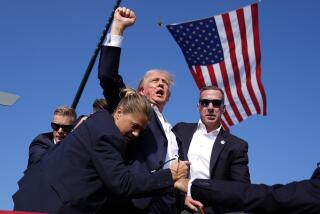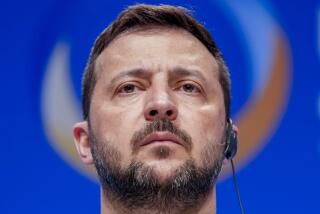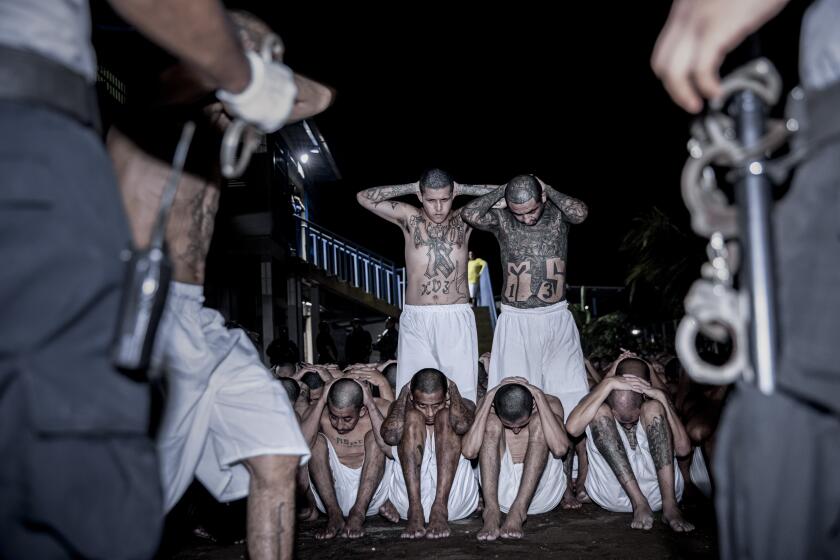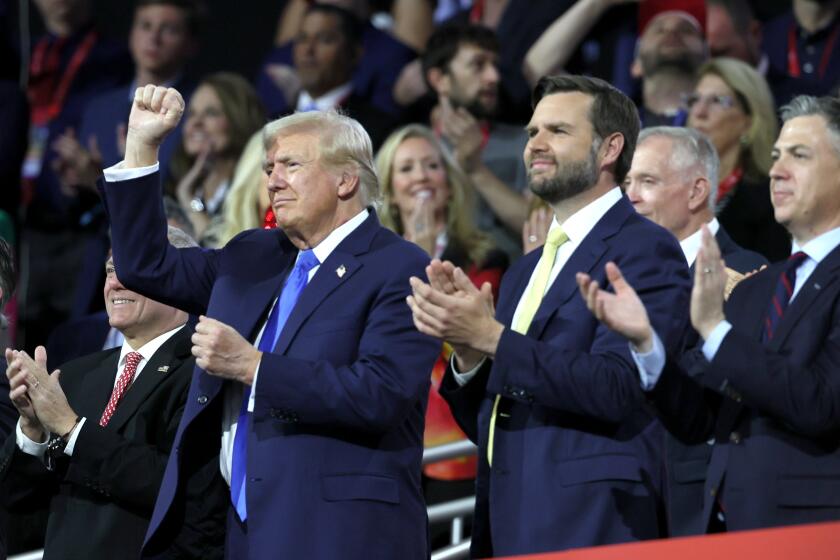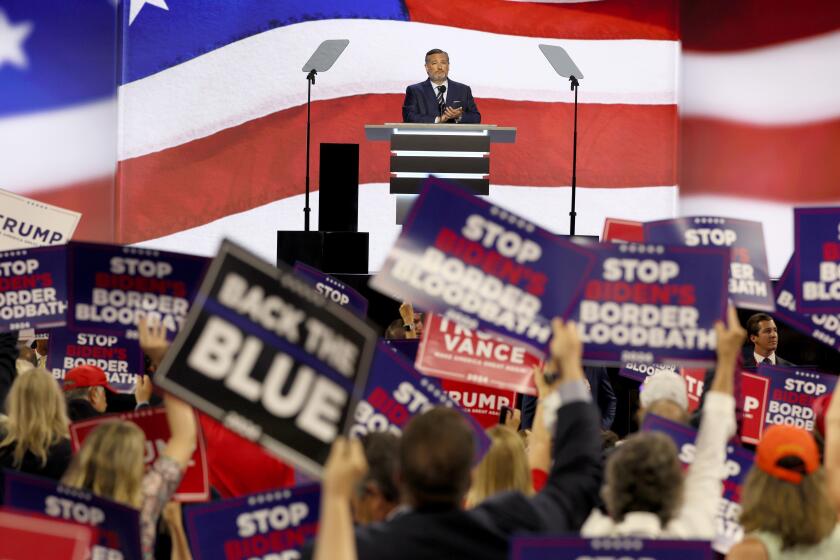Children’s Advocates Map Strategy
On the pressing issues facing society, Billie Maguire asks you to pose a simple question: Is it good for children?
She is direct, articulate, with piercing eyes that are not afraid to engage, and, in her role as a children’s advocate, she is awfully persuasive.
On this day the Claremont resident is coordinating volunteers at the Los Angeles Convention Center for the Children’s Defense Fund’s national conference, surrounded by 2,500 like-minded participants in an environment that is as nurturing as a mother’s womb.
More resources for children’s health care? After-school programs? Classes to prevent teenage pregnancy? For those in the conference, no right-thinking person could oppose such efforts.
But outside the convention hall is a starker reality. The nation seems less willing than in previous years to spend money on social causes. And conservative politicians and the religious right pose major obstacles for the fund and its agenda of social change.
What is it like with Republicans in control of Congress? “You laugh, you cry and you keep on working,” says Maguire, who is attempting to synchronize the efforts of 350 volunteers at the conference, which ends this evening.
It is no accident that the conference program is laden with workshops that emphasize political strategies and coalition-building. For those wanting to learn how to affect party platforms and candidates’ positions, a session was held Friday.
How about the agenda of the “radical right”? Advocates learned how to deal with it in a workshop called “Broadening Our Strategies to Build Support for Children.”
Maguire and a colleague even developed a session called “Spiritual Renewal” to enhance meditative and prayer skills-- “resilience training,” says Maguire, that helps advocates muster the stamina to keep on fighting “the good fight.”
*
Of course, not many people will publicly object to helping children, Maguire said. Opposition tends to center on the proper role of government in caring for children, or on religious objections to programs like sex education and birth control. And the Washington-based Children’s Defense Fund, founded by Marian Wright Edelman 25 years ago, is a high-profile organization that has attracted high-powered support.
A reception earlier in the week to recognize local youths attracted a number of celebrities, including Maya Angelou, Quincy Jones and Los Angeles’ Republican Mayor Richard Riordan and his wife Nancy Daly, who is also a children’s advocate.
When asked why children’s issues are not a high priority, the mayor responded: “We need Congress to wake up. I think that more and more they are--people like Newt [Gingrich] and [Richard] Gephardt. Money is important but leadership also has to be there, people willing to be accountable.”
Indeed, the organization and other advocates won a major victory in 1997 with bipartisan passage of a $48-billion child health insurance program partially funded by a new tobacco tax.
Nonetheless, child advocates say that they lost one of the most important battles of the decade in 1996 when Congress passed--and President Clinton signed--landmark welfare reform legislation that severely restricts government assistance for poor families and immigrants.
The advocates say that they will fight back by doing more of what they have already started: building coalitions across political and religious lines and emphasizing community-based, grass-roots power.
“No one has a corner on Christianity,” Edelman said in a recent interview. And she has always stressed the spiritual and moral underpinnings of the fund’s goals.
In the group’s recently released State of America’s Children report, Edelman says: “We must work together to resist the political either/or-ism and organizational turf-ism that plague so much policy development, advocacy, service and organizing today.”
*
In 1996 the fund brought more than 300,000 people to the Lincoln Memorial in Washington for what it says was the largest demonstration in American history to support children’s issues. The group plans another “stand for children”--this time focusing on child care--on June 1 in all 50 states.
But much of the nitty gritty work of advocacy falls on people like Maguire, who first met Edelman nearly 40 years ago, while Edelman and Maguire’s husband were at Yale. She is on the fund’s California steering committee and 14 years ago helped to establish a local advocacy group called Child Watch.
Maguire now coordinates an east county chapter of Child Watch that includes the cities of Pomona, San Dimas, La Verne, Diamond Bar, Walnut and Claremont--none regarded as bastions of liberalism. Yet the area is saddled with the social ills of many cities--pockets of poverty, incidents of child abuse and problems with teenage pregnancy.
*
Maguire says that her group started by bringing together community leaders for “visitations”--for example, taking them to Jordan High School or the neonatal unit at Martin Luther King Jr. Hospital/Drew Medical Center for a first-hand look at problems they could influence.
The group scored some impressive victories: creation of a regional master plan for children, the opening of several county-run adolescent health clinics, more frank discussion of sex education in schools.
Maguire is a former teacher with a master’s degree in education, a North Carolina native whose childhood in the segregated South helped to form her outlook. Her religious upbringing as a Baptist and her support for civil rights are closely linked, she says.
Those early days of “conflict and resolution” underscored the importance of making allies, she said.
Maguire says that, replying to a school superintendent who declined to push for smaller classes, citing a lack of money, she told him: “It doesn’t matter. You’ve at least got to let people know you’re smart enough to realize it’s important.”
At the next school board meeting, reducing class size made the list of priorities.
Her group sets up a voter registration booth at most of the events it sponsors, said Maguire. “Communities have a lot of power--if they vote. If advocates can do anything, it’s to help voters see what the issues are. It’s to the politician’s advantage to obscure them.”
*
The group also has a core of supporters that it can mobilize quickly to phone, write and lobby legislators. Most recently, they prevailed on the child health insurance legislation. And they are gearing up to oppose a Senate bill that would allow states to put more children in adult jails and reduce the confidentiality of juvenile records.
Maguire says that her group will also be monitoring the impact of welfare reform and focusing more on helping adolescents, who she says are not nearly as easy to advocate for as children.
“I can’t tell you whether I’m persuasive or not,” Maguire said. “But you give it your best shot. It’s your life.”
More to Read
Start your day right
Sign up for Essential California for news, features and recommendations from the L.A. Times and beyond in your inbox six days a week.
You may occasionally receive promotional content from the Los Angeles Times.

